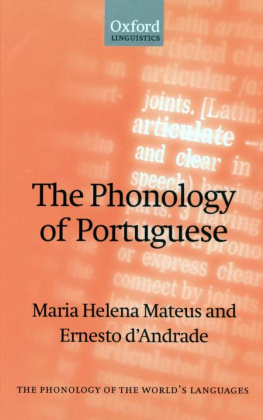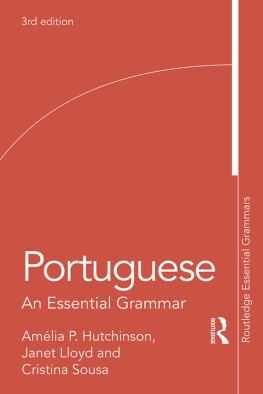Series Editor.' Jacques Durand. Universite de Toulouse-le-Mirail
The phonology of most languages was once and to a large extent still is available only in a fragmented way. through unpublished theses, or articles scattered in more or less accessible journals. Each volume in this series offers an extensive treatment of the phonology of one language within a modern theoretical perspective, and provides comprehensive references to recent and more classical studies of the language. The following are normally included: an introduction situating the language geographically and typologically, an overview of the theoretical assumptions made by the author, a description of the segmental system and of the rules or constraints characterizing the language. an outline of syllable structure and domains above the syllable, a discussion of lexical and postlexical phonology, an account of stress and prominence, and, if space allows, some overview of the intonational structure of the language.
Each volume is cast in a modern theoretical framework, but there has been and will always he scope for a diversity of approach which reflects variations between languages and in the methodologies and theoretical preoccupations of the authors.
Published in the series:
The Phonology of Norwegian
Gjert Kristoffersen
The Phonology of Hungarian
Peter SiptSr and Mikl6s Torkenczy
The Phonology of Portuguese
Maria Helena Mateus and Ernesto d'Andrade
The Phonology of English
Michael Hammond
The Phonology of Dutch
Geert Booij
The Phonology of Armenian
Bert Vaux
The Phonology of German
Richard Wiese
The Phonology and Morphology of Kirnatutumhi
David Odden
The Lexical Phonology of Slovak
Jerzy Ruhach
Maria Helena Mateus
and
Ernesto d'Andrade



In this book the reader will find a broad concept of phonology: syllable, stress and segments, as well as morphological aspects implying phonological processes. The work presents an overview of the field, putting together and enlarging partial analyses, our own and those of colleagues, most of which have so far been presented in Portuguese only. To make available to students of phonology and to linguists a substantial body of relevant data and analyses, and to raise crucial questions and suggest directions for alternative interpretations of this data, has presented us with a pleasurable challenge. To support our analyses we have relied on those theories which in our view best explain language design and structure in relation to the facts of phonology.
European and Brazilian Portuguese are somewhat different at the phonetic level. Thus we have tried to present a comparative account of both varieties, to allow readers to appreciate their common underlying system.
We hope that the hook will provide relevant information, new insights, and suggestive ideas for those who wish to deepen their knowledge of the phonology of Portuguese.
We owe a debt of gratitude to all those colleagues, students, and audiences who discussed many parts of the book with us while it was in preparation and whose remarks led us to improve upon earlier versions of the text.
We would especially like to thank Amalia Andrade for her contribution in refining the style and the analyses proposed in Chapter 2. We are also indebted to Alan Kihm, Alina Villalva, Bernard Laks, Maria do Ceu Viana, Maria Joao Freitas, and Marina Vigario.
We sincerely thank Jacques Durand, the series editor, for his constant support and his readiness to discuss various aspects of the work. Finally, we appreciate the assistance that was provided in the final stages of preparing the typescript by the editorial team of OUP.
I
I
1. 1. AIM AND THEORETICAL FRAMEWORK
The aim of this book is to describe the phonological system of Portuguese and to discuss its functioning in the light of recent phonological theories. Chapters I and 2 are introductory: they describe some of the phonetic, phonological and morphological characteristics of European Portuguese (henceforth EP), where relevant including data from Brazilian Portuguese (henceforth BP). Chapter 2 also deals with theoretical aspects such as feature geometry and underspecification. Some of this material will be further discussed in later chapters. From Chapter 3 onwards, the analyses are based on autosegmental theory, and Portuguese phonological processes, both segmental and prosodic, are set out in terms of a multilinear structural organization. The discussion of nasalization, phonological and morphological processes. syllable and stress presupposes such a theoretical framework. All the models we use are from the sane theoretical background and have been chosen for their explanatory power.
1.2. RELEVANT HISTORICAL MILESTONES AND SYNCHRONIC VARIATION
Portuguese is a Romance language closely linked to Castilian and Catalan. In Europe, Portuguese is spoken in Portugal. In traditional studies on dialectology, and for historical reasons, the dialects spoken in Galicia (Spain) have been grouped with the Galician-Portuguese dialects (see Cintra, 1971 a). We shall not consider them here. It was in Galicia, which was founded in the third century and was a part of the Roman-occupied lands of Gallaecia and Asturica, that the Portuguese language emerged from Vulgar Latin. The inhabitants of this peripheral and inaccessible area retained in their language the typical characteristics of the archaic Low Latin spoken by their colonizers.


















